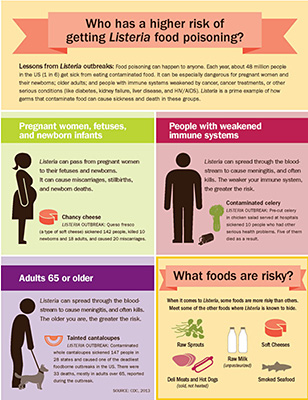CDC: Listeria Outbreak Linked to Dairy Products
go.ncsu.edu/readext?985432
en Español / em Português
El inglés es el idioma de control de esta página. En la medida en que haya algún conflicto entre la traducción al inglés y la traducción, el inglés prevalece.
Al hacer clic en el enlace de traducción se activa un servicio de traducción gratuito para convertir la página al español. Al igual que con cualquier traducción por Internet, la conversión no es sensible al contexto y puede que no traduzca el texto en su significado original. NC State Extension no garantiza la exactitud del texto traducido. Por favor, tenga en cuenta que algunas aplicaciones y/o servicios pueden no funcionar como se espera cuando se traducen.
Português
Inglês é o idioma de controle desta página. Na medida que haja algum conflito entre o texto original em Inglês e a tradução, o Inglês prevalece.
Ao clicar no link de tradução, um serviço gratuito de tradução será ativado para converter a página para o Português. Como em qualquer tradução pela internet, a conversão não é sensivel ao contexto e pode não ocorrer a tradução para o significado orginal. O serviço de Extensão da Carolina do Norte (NC State Extension) não garante a exatidão do texto traduzido. Por favor, observe que algumas funções ou serviços podem não funcionar como esperado após a tradução.
English
English is the controlling language of this page. To the extent there is any conflict between the English text and the translation, English controls.
Clicking on the translation link activates a free translation service to convert the page to Spanish. As with any Internet translation, the conversion is not context-sensitive and may not translate the text to its original meaning. NC State Extension does not guarantee the accuracy of the translated text. Please note that some applications and/or services may not function as expected when translated.
Collapse ▲On February 6th, 2024, the CDC announced a listeria outbreak that has been linked to cheeses and yogurt produced by Rizo-López Foods (Modesto, California), including queso fresco and cotija cheese. The outbreak has confirmed cases in 11 states, including North Carolina.
According to the FDA:
L. monocytogenes is widespread in the environment, especially in soil and water. The bacteria can survive in soil for many months. Animals, particularly cattle, can carry L. monocytogenes without appearing sick and shed the bacteria in their feces.
The bacteria are able to live in a wide range of conditions and environments—they can tolerate both acidic and salty conditions, both high and low temperatures, and a fairly low moisture content. These characteristics allow L. monocytogenes to survive a long time in a variety of food products and food processing plants. Because the bacteria can multiply and persist in food processing plants for years—even more than 10 years in one documented case—L. monocytogenes is especially hard to control and can result in intermittent contamination of food.
Unlike most bacteria, L. monocytogenes can grow and multiply at low temperatures, making the bacteria a potential problem even in properly refrigerated food. One study also found a relatively high percentage of frozen raw beef products contaminated with L. monocytogenes. This finding highlights the ability of the bacteria to thrive in cold environments (Pao & Ettinger).
If you have purchased a product on the recall list, discard the food and clean and disinfect all surfaces that have made contact with the food. Contact your doctor if you experience any of the following symptoms: fever, muscle aches, and tiredness. Symptoms may also include a headache, stiff neck, confusion, loss of balance, or seizures. Serious illness is more likely in susceptible populations: adults over age 65, immunocompromised individuals, infants and pregnant women. It is particularly dangerous to the unborn – risking pregnancy loss, serious infection or premature birth.

Infographic courtesy of CDC.gov




